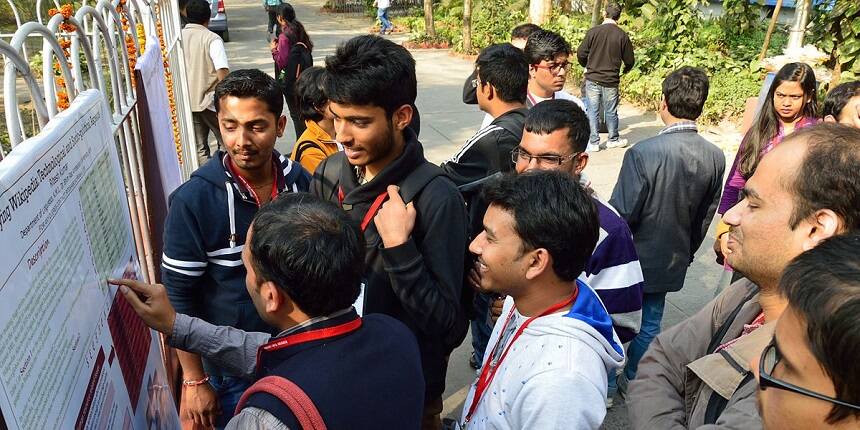DU Admission 2023: Where are the students from southern state boards?
Atul Krishna | August 10, 2023 | 01:07 PM IST | 7 mins read
DU UG Admission 2023: CUET exam, NCERT syllabus, reliance on coaching have all made DU admission tougher for students from southern state boards.
Colleges/Universites Accepting CUET Score
Download list of Colleges/ Universities Accpeting CUET/CUCET Score with Cut-OFFs
Download Now
NEW DELHI: No school board from any of the southern states was among the top five school boards with the most students in the first merit list for Delhi University (DU) admissions 2023. The first DU merit list, issued on August 1, was dominated by students from the Central Board of Secondary Education (CBSE) and the Council for the Indian School Certificate Examinations (CISCE), which are mostly private schools.
Latest: Check DU PG Seat Allotment 2025 | Vacant Seats for Spot Round 4
DU PG Spot Round 2025: First Cutoff | Second Cutoff | Third Cutoff
DU PG 2025: Third Cutoff | Second Cutoff | First Cutoff
Don't Miss: NIRF DU Colleges Ranking
The state boards in the top five were Bihar, Uttar Pradesh and Rajasthan – all northern states who, despite their presence in the top five, contributed only a few students each. While nearly 72,000 CBSE students were allotted seats in the first merit list in DU admission 2023, the top state board was Bihar School Examination Board (BSEB) with a distant 2,344. The state-wise distribution of applicants on the Delhi University Common Seat Allocation System (DU CSAS portal) presented a similar picture.
How did the southern board disappear from DU UG admission 2023 statistics?
The biggest change in UG admissions was the introduction of the Common University Entrance Test (CUET exam) in 2022. A national-level test for admission to all the central universities, it replaced the older system of admitting on the basis of Class 12 board exam results.
Also Read| ‘Additional students mean more revenue’: Private funding, faculty rating in UGC guidelines
Delhi University last admitted students on the basis of Class 12 board exam results in 2021. That year, Kerala sent the fourth highest number of students with over 1,600 admissions. In 2023, it appears to have fallen off the map for DU admissions despite the institution being a central university. Teachers point to a host of factors related to the shift to CUET – coaching, gaps in syllabus, lack of awareness and orientation – for this drop.
“A lot of our students routinely get into central universities and this has remained the same. However, I see a difference in the past two years. Since the CUET, fewer students have been able to get in,” said Mohammed Shafi K, principal, PKMMHSS Edarikkode. PKMMHSS Edarikkode in Malappuram district has the largest number of students attempting the Class 10 and Class 12 examinations by the Kerala Board of Public Examination.
“The students are oriented towards the board exams and now, since the new exam has come in, there is a change in the pattern of questions. Since now, areas such as general knowledge are given importance for admission rather than just being focussed on the subject knowledge. Students are not trained to attempt this pattern of objective questions,” said Shafi.
Delhi University’s second seat allocation list will be released today at ugadmission.uod.ac.in.
 DU Admission 2023: Fewer students from PKMMHSS Edarikkode are getting into central universites (Image: FB\PKMMHSS Edarikkode)
DU Admission 2023: Fewer students from PKMMHSS Edarikkode are getting into central universites (Image: FB\PKMMHSS Edarikkode)
DU Admission: CUET syllabus gap
Schools have also pointed to the difference in syllabus between the various state boards and the CUET syllabus. Students from Tamil Nadu, which has not featured in the top 10 state boards in Delhi University admissions in the past three years, form one of the groups most affected by this gap, teachers said.
“There is a very big disadvantage because we don’t follow the National Council of Educational Research and Training (NCERT) syllabus. The national curriculum is totally different from the state curriculum. There needs to be some bridging that has to be done for students to perform well. Not only CUET, if you look at Joint Entrance Exam (JEE) Main or National Eligibility cum Entrance Test (NEET), the number of Tamil Nadu students getting in is relatively low. The Tamil Nadu syllabus may vary by 20-30% from the NCERT syllabus. That means there is a 20-30% gap already,” said John Arokia Prabhu, vice president of Tamil Nadu Private Schools Association, which is an organisation of private schools affiliated to the Tamil Nadu state board.
School authorities said that they have voiced their opinion against centralised exams for over a decade citing the lack of uniform syllabus across the country.
“We have been saying this for maybe 10 years. Before centralising universities and exams you should understand that there is no common syllabus. At least Tamil Nadu is somewhat better in that it has some good colleges. But this is definitely a downside. Whether the teachers and students are up to the mark is a different story. If you are conducting a common exam there should be a common syllabus. Without a common syllabus if you are conducting an exam, it is a clear injustice,” said Prabhu.
In a reply to a question in Parliament on August 2, the education ministry claimed that the CUET UG is not based on CBSE syllabus – the CBSE follows NCERT books – but on the general understanding of different Class 12 subjects. Teachers disagree.
Also Read| UGC grants Delhi University autonomy; DU can launch off-campus centres, courses
“From what I’ve seen CUET does give preference to NCERT syllabus. Even in the National Achievement Survey (NAS), they give preference to NCERT. What happens is that the state boards are not addressed. Considering India’s federal context, the state boards need to be addressed,” said Manoj KV, principal of GHSS Vaduvanchal and former research officer of Kerala State Council of Educational Research and Training (SCERT).
The NAS is a large-scale assessment conducted by the education ministry every three years to assess the health of the school education system in the country.
The introduction of CUET had raised concerns about the centralisation of the education system which pushes states to adopt the NCERT syllabus so that their students can qualify national exams for union government-run institutions. Andhra Pradesh has already converted around 1,000 state board schools to CBSE for 2022-23. It plans to gradually increase the number over the years.
States such as Kerala and Telangana have opted to teach NCERT syllabus in Classes 11 and 12 to give the students a better chance in the national competitive exams. However, this brought its own problems.
 Delhi University Admission: CUET exam is based on NCERT and that's why state board students struggle, said teachers (Representational Image: Wikimedia Commons)
Delhi University Admission: CUET exam is based on NCERT and that's why state board students struggle, said teachers (Representational Image: Wikimedia Commons)
Delhi University Admission: NCERT syllabus shift
Kerala follows the SCERT syllabus till Class 10 before shifting to NCERT syllabus in Classes 11 and 12. This, teachers say, creates a gap.
“We see a gap the moment they enter Class 11. Suddenly changing to this NCERT syllabus seems difficult for even the students who have scored high in Class 10. There is a difference in content. This change is not gradual but very sudden,” said Shafi.
Also Read | CUET Exam Impact: Test has left newer central universities with vacant seats
“There is a sudden shift and it happens in two ways. There is a shift from state syllabus to national syllabus and then there is the shift in the medium of instruction which also changes to English. This is very difficult for the students,” said Manoj. Liberal marking till Class 10 meant that students are not well equipped to deal with the higher concepts in the syllabus.
In 2021, the Kerala state board came under criticism for inflated marks as over 1,600 Kerala state board students got into Delhi University, many of them with 100% marks.
Teachers also said that even in Class 12, the Kerala board syllabus has fewer higher order thinking skills (HOTS) questions as compared to NCERT, leaving students unprepared to handle CUET.
“CUET is an objective type of exam. These exam patterns are not familiarised in our higher secondary. HOTS questions are not addressed in our exams.” said Manoj KV.
CUET coaching centre-oriented
School authorities believe that even if these flaws were rectified, students would still not be unable to ‘crack’ the CUET UG without coaching.
“CUET is a coaching centre oriented system. The UGC chairperson said that students only need to learn the Class 12 NCERT syllabus. No student will get in just based on the NCERT syllabus. NEET is a good example. A student who does not go to a coaching class will never get in. They’re promoting the coaching centres and conducting exams for the coaching centres,” said Manoj.
Teachers also said there is a “lack of awareness” among students about CUET and there’s no concerted effort from the state board to resolve this issue. Many students from Scheduled Tribes don’t even apply for CUET, teachers said.
“ Most students don’t know that CUET is there and that this is applicable to so many universities. This should be told to them in Class 10, not in Class 12. All the career guidance classes are given in Class 12. It should be given Class 9 or 10. That's when students decide if they want to go to science and commerce. There is no orientation for CUET from the part of the department,” said Manoj.
Follow us for the latest education news on colleges and universities, admission, courses, exams, research, education policies, study abroad and more..
To get in touch, write to us at news@careers360.com.
Next Story
]‘Additional students mean more revenue’: Private funding, faculty rating in UGC guidelines
The new draft UGC IDP guidelines aim to help universities, colleges plan for academic, administrative, and financial ‘self-reliance’. They push for private funding, expanding UG programmes to generate revenue.
R. Radhika